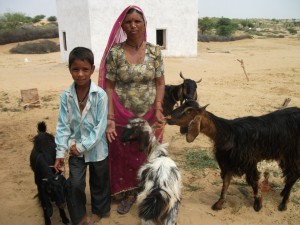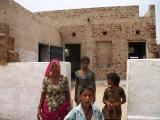

“In the last six months, the biggest change has been that from a thatched house. I have been able to build a concrete house.” —Rukkhi Devi
Life is getting better for Rukkhi Devi. She looks at the two goats she received from Heifer India. These now have four kids. The two to be passed on are ready for the big ceremony. The goats changed her life. She got three liters of milk every day: she kept one for her family's consumption and sold the rest at about $1 per liter to the local merchant. The family has sold two bucks for 5,000 Rupees (about US $ 100) this month. About 10 months ago, they sold a male kid male for $40. The family has earned a total of $140 that has increased their family income.
But in order to get this result, Rukkhi had to learn how to keep her livestock. She learned the benefits of keeping the goats in a shed so the hot summer sun would not burn their skin. She learned how to stall-feed them too. The fodder seeds Heifer provided also helped.
Rukkhi is also seeing the benefits of the vegetable seeds she received. Now the family has eaten green vegetables every day for the last three months. These positive results encouraged them to plant eight more trees this year.
The highlight of the project were the three import trainings Rukkhi received:
Editor's note: This post is part of a series that follows the progress of specific families, starting at the beginning of their work with Heifer. In Asia/South Pacific, our colleagues have chosen one family in each region in the countries where we work and will bring us quarterly updates. You can read the first story about Rukkhi Devi and her family here.